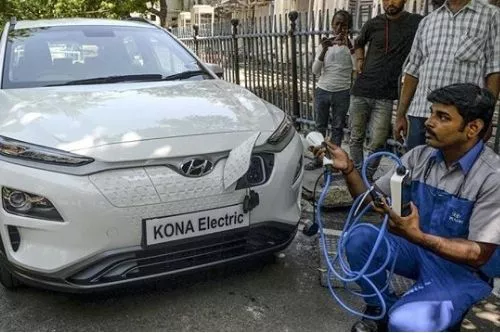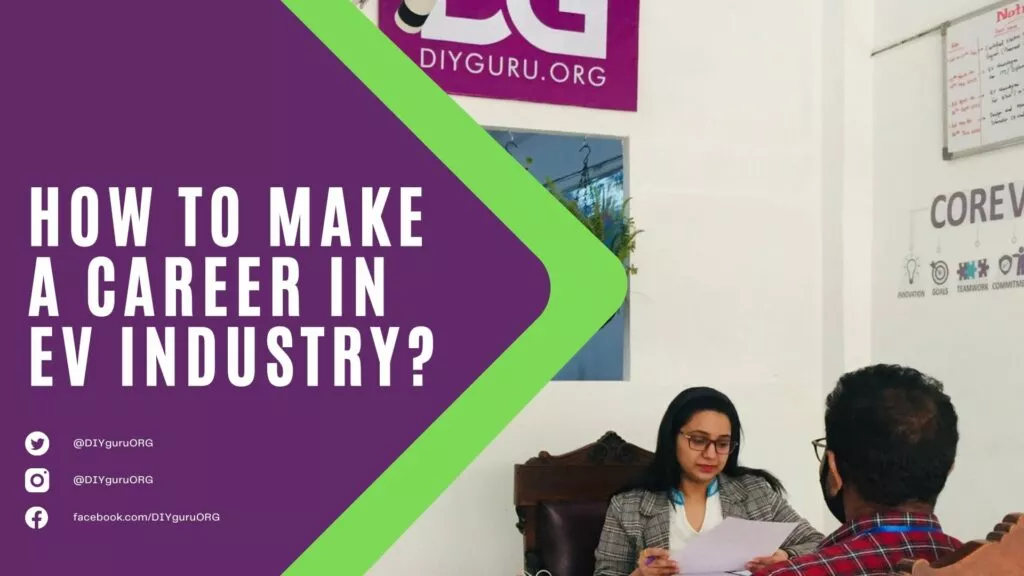Top Job Oriented Electric Vehicle Training Courses in India.

Current Global Workforce Scenerio
Global automotive industry has always trusted the skilled labour and technical workforce since the first Industrial Revolution. With the onset of the Electric Vehicle Revolution in the last decade, the situation has changed very little. Every country including major electrical automotive manufacturing giants like the UK and EU still employ as high as 3.5 million people in this industry. Even India finds itself in the need of at least 20 million Electric Vehicle engineers, technicians, researchers and labourers (European Climate Foundation and Niti Ayog, 2019). With the growing focus on switching transportation from ICE vehicles to Electric vehicles, there are a lot of job opportunities that the existing workforce, as well as the fresh talent, can capitalize on. Here we will also discuss the job opportunities the EV industry presents.
The limitations of current academic curriculum related to Electric Vehicle manufacturing, battery management systems and charging infrastructure, leaves EV enthusiasts and academicians with no option but to pursue independent Electric Vehicle training courses. There are many independent institutions in India which provide comprehensive Electric Vehicle courses to students and experienced professionals. Here is a complete beginners guide to navigate the EV industrial training segment in India.
Types of Electric Vehicle Training Courses
Indian academic institutions and industrial organisations have been struggling to match the rising demand of skilled labour in the Electric Vehicle Industry. The suggestions of Niti Ayog and Rocky Mountain Institute (2017) include development of a ‘Nationalised Learning Platform’ for researchers, academic institutions, OEMs (Original Equipment Manufacturers), State/Govt. And other Private stakeholders.
The Government of India has also been in the process of developing the Swayam platform and raising the level of NPTEL courses to provide industrially salient certification programmes. But lack of proper IT infrastructure has led to multiple delays. There are still options of independent certification institutions approved by various government and public institutions like Automotive Research Association of India (ARAI), Automotive Skills Development Council (ASDC), Central Staff Training and Research Institute (CSTARI).
The following details of Electric Vehicle Training Courses can help EV professionals and aspirants to identify which learning options match the industry requirements.
Categories
- Electric Vehicle Fundamental Certification Course
- Electric Vehicle Intermediate Certification Course
- Electric Vehicle Advanced Certification Course
- Electric Vehicle Internships and Co-ops
- Electric Vehicle Nanodegree Programmes
- Electric Vehicle Specialization Programmes
- EV Research and Development Programmes
- For EV Business Owners & Entrepreneurs: (Nanodegree in EV Business)
- For Design & Engineering Students Looking for Job Assistance: (Nanodegree in EV Technology)
- For Professionals working in Auto Industry looking forward to Upskill their knowledge in EV: (Specialization Course in EV)
- For Complete Beginners with 10+2 & Non-Technical Background in Commerce, Arts, Law, Management: (Fundamental of Electric Vehicle Technology Certification Course)
- For professionals looking for a specialized course in Electric Vehicle Powertrain Technology (Advanced Certification Course in EV Powertrain)
- For Engineers working in R&D Sector and looking for System Integration in EV – (Sytem Integration of EV)
- For BMS & Battery Specialization course suited for Chemical Engineers – (BMS Specialization Course)
Electric Vehicle Degree Programmes

Students looking for an academic approval in the Electric Vehicle industry may opt for the formal degree programmes in EV manufacturing, design and business. Engineering institutions like IIT-Madras and IIT-Delhi have started their own research centres for EV Mobility (C-BEEV, Centre for Battery Engineering and Electric Vehicles). This allows students to have more practical exposure to the ongoing research in the field.
However, only a few elite institutions have research facilities for hybrid vehicles, battery infrastructure for grid or charging. DIYguru is one institution whose electric vehicle course has recently been approved by ASDC & AICTE other than that none of the institutions currently offer approved courses by the AICTE or UGC. While there are some institutions like Chitkara University, Amrita University, GISE which provide specialised degree courses for Electric Vehicle training, most of them are deemed universities or institutions. To sum it up only a handful of Indian academic institutions have receive their final approvals from NSDF (National Skill Development Federation) or AICTE for proposed Electric Vehicle curriculum.
Electric Vehicle Internships and Co-Ops
The future of the Electric Vehicle Industry in India is being driven by the manufacturing advantage and talent pool of the nation. As accepted by ex-HRD Minister Hon’ble Prakash Javdekar, AICTE approved curriculum takes at least 3 years to update. This happens for mainstream courses but not for avant-garde fields like electric mobility and grid infrastructure. In line with the unavailability of academic opportunities students who wish to pursue higher education in the Electric Vehicle industry, can attend Electric Vehicle internships and industrial co-ops.
Students with minimal or no prior exposure to Electric Vehicle training courses can attend such programmes to improve their EV skills. Electric Vehicle internships offer students an entry into the EV community and helps them to choose a specialization to pursue in the future. Such courses are often offered under the Excellence centres of Academic Institutions/Universities deployed by EV Consultancy Leaders and Think Tanks.
Electric Vehicle Certification Programmes
Electric Vehicle Certification Programmes offer the latest information to EV aspirants in this industry. Independent research institutions, Electric Vehicle consultancy companies, and training centres offer such Electric Vehicle training courses. These institutions continuously update their curriculum based on the latest developments in the industry. The pedagogical panel of such courses often comprises of industry veterans, subject-matter experts, patent owners, OEM R&D personnel and international teaching staff.
Such courses are often accredited by international standards institutions like SAE, ASME, ARAI, NSDF, ASDC etc. Electric Vehicle Certification Programmes offer specializations to aspirants like Vehicle Grid Integration (VGI), usage of LFP (Lithium-Ferrous-Phosphate-Graphite) Batteries, Leaf Battery Integration, CAFE compliance, etc.
Such courses are often suitable for aspirants who have some basic Electric Vehicle Training in form of a crash course, internship or co-op. Most of these Electric Vehicle training courses are designed for employability improvement or knowledge development of Electric Vehicle professionals and enthusiasts. Popular organisations like ASDC, DIYguru, SAE-India, Skill-Lync, NPTEL, provide such certification programmes and batches are mostly open throughout the year.
Industrial Knowledge Development Programmes and Conventions
Indian science and technology communities have always cherished the professional forums of various specialisations for many years now. These communities offer opportunities to experienced professionals and industry members to debate, contribute and collaborate with each other to inspire the latest developments in the respective field. Electric Vehicle Communities is a relatively new and under-explored concept in India. Through Knowledge Development Programmes (KIPs) and Conventions, the corporate community gets an opportunity to lead collective learning initiatives in the Electric Vehicle industry. KIPs and Conventions are usually workshops summed up in days or weeks conducted by Electric Mobility Consultants, Learning Centres, and Standards Institutions. They offer theme-based learning oftenly aligned with brainstorming sessions, seminars by industry leaders, research paper recitations on latest technical developments and practical problem-solving sessions.
Currently such programmes are being offered only by a limited number of institutions like ARAI and DIYguru India.
| Electric Vehicle Training Type | Eligibility (best match) | Mode of Learning | Top Providers/platforms |
| Degree Programmes | Engineering & Diploma students | Classroom | Selected deemed universities |
| Internships and Co-ops | Engineering & Diploma students | Workshops + Classroom | SAE, DIYguru |
| Certification Programmes | Engineering/Diploma students + Fresh/Experienced Employees | Workshops + Classroom + Online + Laboratories | SAE, ARAI, DIYguru India, NPTEL |
| Industrial Programmes | Experienced Employees + OEM personnel + Research Fellows + Academicians | Convention + Seminar | ARAI, DIYguru India, ASDC |
Electric Vehicle training courses are provided for various specializations in the industry. Almost all learning programmes are usually theme based and provide certification in a specific EV trade. In order to get the maximum outcome from an Electric Vehicle course in India one should know what kind of specializations are available in this field. It has been found that the following specializations currently have the highest scope of development in the electric and hybrid vehicle industry for the next few years.
Specializations in Electric Vehicle Training Courses
- Electric Vehicle Powertrain Design and Fabrication
- Battery Management Systems
- EV Charging Infrastructure Technology
- Electric Vehicle Design (Mechanical and Embedded Systems)
Here is more information about the Electric Vehicle training specializations in India.
Electric Vehicle Training Courses for Powertrain Design and Fabrication
Electric Vehicles are basically dependent on the extraction of electric power and its transmission to the powertrain for motion. Powertrain Design, Fabrication and Integration Courses for Electric Vehicles enable any aspirant to understand the operational depth of an EV or Hybrid Electric Vehicle (HEV). Such courses generally inform students about inverter topologies (battery pack and vector control), semiconductor studies, cooling mechanisms and more. Some key topics covered in such EV training courses are:
- Convertor and Inverter Topology
- Power Loss studies
- Metal-Oxide-Silicon Field Effect Transistor (MOSFET) analysis
- Magnetic Circuits (Force vs. torque production)
Electric Vehicle Training Courses in India for Battery Management Systems
The United States Advanced Battery Consortium has challenged the EV Mobility community to formulate solutions for achieving the US$ 250 per kWh target. Battery Manufacturing OEMs across the world are thus looking forward to get R&D solutions in this context. Electric Vehicle courses in BMS (Battery Management Systems) help students and professionals to study:
- BMS Architecture
- Cell Balancing
- Sensory Systems
- Degradation Control
- CAN Management systems
Electric Vehicle Training Courses in India for EV Charging Infrastructure
As mentioned in the ZEV (Zero Emissions Vehicle) Policy Framework, the government has now started to emphasise on supply-chain management of Electric Vehicle energy systems. As a result charging system studies have been included in various certification programmes. Electric Vehicle certificate specialization in charging infrastructure also has huge business potential in the upcoming times. Under these programmes students, professionals and business owners can learn about:
- Bharat Charging Protocol
- On-Board (OB) Charging and On-Off Grid Charging
- EVSE Protocols for Charging Infrastructure
- FMVSS standards
Electric Vehicle Training Courses in India for Vehicle Design
Structural Designing is but only a single aspect of Electric Vehicles in India. For EV mobility to be commercially viable both embedded systems and control systems should be designed sustainably. With the introduction of IoT based Automotive Manufacturing, training courses have recently updated their curriculum. Students commonly seek such courses to upgrade their skills from CAD-CAE programmes. Electric Vehicle Design courses offers the following learning outcomes:
- HV/LV Embedded systems integration
- HVAC design
- Braking and Transmission Systems
- Component sizing & integration trade-offs
- CAD/CAE/ simulation and design compliance
Cost and Duration of Electric Vehicle Training Courses
Following is a comparative analysis of cost and return on investment of common Electric Vehicle training courses.
| Electric Vehicle Training Course Type | Course Duration | Cost of Electric Vehicle Training Course | Key Outcomes |
| Degree Programmes | 2 – 4 Years | INR 1,00,000/year | University credits & Degree Certificate |
| Nanodegree Programme | 6 months | INR 50,000 – INR 1,00,000 | Certification + Employment Opportunity |
| Specialization Programmes | 2 weeks – 3 months | INR 8,000 – INR 90,000 | Intermediate and Advanced qualification + Employment opportunities |
| Industrial Programmes | 2 days – 2 weeks | INR 15,000 – INR 50,000 | Electric Vehicle skill development + Customized Industrial (employee) Training |
The future of the Electric Vehicle industry is full of dynamic opportunities for both technical and non-technical aspirants. Students and professionals who wish to explore various opportunities in the field of electric mobility must enrol for Electric Vehicle training courses regularly. Such programmes help them in staying updated about the national market and latest application based technical trends of the industry.
McKinsey Report on Electric Vehicles business in India shows an annual increase of sales by 59%. This shows the growth that one can expect from the Indian EV industry in the coming times. It is necessary that Electric Vehicle and battery System OEMs, academic institutions, students, EV businesses (esp. MSMEs), and professionals realize the need of skilling in the field of electric cars and hybrid vehicles. The programmes mentioned above offer umpteen possibilities for any willful aspirant in this ever-growing industry.
Topics included in Certification Programmes
Unit I: Introduction to Hybrid Electric Vehicles: (6 Hrs)
History of hybrid and electric vehicles, social and environmental importance of hybrid and electric vehicles, impact of modern drive-trains on energy supplies
Conventional Vehicles: Basics of vehicle performance, vehicle power source characterization, transmission characteristics, and mathematical models to describe vehicle performance.
Unit II: Hybrid Electric Drive-trains: (8 Hrs)
Basic concept of hybrid traction, introduction to various hybrid drive-train topologies, power flow control in hybrid drive-train topologies, fuel efficiency analysis
Electric Drive-trains: Basic concept of electric traction, introduction to various electric drive-train topologies, power flow control in electric drive-train topologies, fuel efficiency analysis.
Unit III: Electric Propulsion unit: (6 Hrs)
Introduction to electric components used in hybrid and electric vehicles, Configuration and control of DC Motor drives, Configuration and control of Induction Motor drives, configuration and control of Permanent Magnet Motor drives, Configuration and control of Switch Reluctance Motor drives, drive system efficiency.
Unit IV: Energy Storage: (6 Hrs)
Introduction to Energy Storage Requirements in Hybrid and Electric Vehicles, Battery based energy storage and its analysis, Fuel Cell based energy storage and its analysis, Super Capacitor based energy storage and its analysis, Flywheel based energy storage and its analysis, Hybridization of different energy storage devices.
Unit V: Sizing the drive system: (8 Hrs)
Matching the electric machine and the internal combustion engine (ICE), Sizing the propulsion motor, sizing the power electronics, selecting the energy storage technology, Communications, supporting subsystems
Unit VI: Energy Management Strategies: (6 Hrs)
Introduction to energy management strategies used in hybrid and electric vehicles, classification of different energy management strategies, comparison of different energy management strategies, implementation issues of energy management strategies
TEXTBOOK:
- “Electric and Hybrid Vehicles Design Fundamentals” (2nd Edition), by Iqbal Husain
REFERENCES:
- “Hybrid Electrical Vehicle Principles and Application with Practical Perspectives” by Chris MI, M. Abul and David Wenzhong Gao
- “Propulsion System for Hybrid Vehicle” 2nd Edition” by John M. Miller
- “Modern Electric, Hybrid Electric and Fuel Cell Vehicles Fundamentals, Theory and Design” By Mehrdad Ehsani, Yimin Gao and AliEmadi
Project Based labs:
Project 1: Project based on Hybrid vehicles drive train
Project 2: Project based on Electric vehicles drive train
Project 3: Project based on determination the power requirement of hybrid /electric vehicles
Project 4: Project based on sizing of the various components for hybrid /electric vehicles
Project 5: Project based on testing of hybrid /electric vehicles
Course Outcomes:
Students will be able to
- Demonstrate, and compare the conventional vehicles and hybrid vehicles
- Demonstrate, and analyze the drive trains of hybrid vehicles and electric vehicles
- Demonstrate, compare and analyze the motors used in hybrid vehicles and electric vehicles
- Demonstrate, compare and analyze the energy storage systems used in hybrid vehicles and electric vehicles
- Analyze the sizing of the components for the hybrid and electric vehicles
- Demonstrate the utilization of various energy management strategies in the hybrid vehicles
Unit I: Hybrid vehicles Analysis (6 Hrs)
Unit II: Hybrid vehicles Analysis: (6 Hrs)
Unit III: Electric vehicles Analysis: (6 Hrs)
Unit IV: Electric vehicles Analysis: (6 Hrs)
Unit V: Hybrid vehicles simulation (6 Hrs)
Unit VI: Hybrid vehicles simulation (6 Hrs)
Reference Books:
- User Manuals Hybrid Vehicle simulation Software’s
- “Electric and Hybrid Vehicles Design Fundamentals” (2nd Edition), by Iqbal Husain
- “Modern Electric, Hybrid Electric and Fuel Cell Vehicles Fundamentals, Theory and Design” By Mehrdad Ehsani, Yimin Gao and AliEmadi
Project Based labs:
Project 1: Project based on Hybrid vehicle analysis
Project 2: Project based on Electric Vehicle analysis
Project 3: Project based on software
Project 4: Project based on simulation of hybrid vehicles
Project 5: Project based on simulation of electric vehicles
Course Outcomes:
Students will be able to
- Analysis of hybrid vehicles
- Analysis of electric vehicles
- Understanding the use of Simulation software
- Do the simulation of Hybrid vehicle with MATLAB
- Demonstrate, the skill for Engine simulation software’s and Hybrid vehicles simulation software’s
- Have hands on experience for Engine simulation and Hybrid /Electric vehicle simulation
Here is a comparison of some of the most popular EV courses in India:
| Institution | Course | Duration | Fees | Accreditation |
|---|---|---|---|---|
| DIYguru | Electric Vehicle Nanodegree Program | 12 months (Most comprehensive) | INR 70,000 | AICTE, ASDC (Global Degree Certification) |
| IIT Delhi | Electric Vehicle Engineering Certification Program | 6 months (Theoretical) | INR 1 lakh | IIT Delhi (Professional Certification) |
| Symbiosis Institute of Technology | Electric Vehicle Certification Course | 3 months (Short Term) | INR 30,000 | Symbiosis Institute of Technology (Certification) |
| Skill Lync | Electric Vehicle Design & Analysis Course | 6 months (Software Based) | INR 2,50,000 | Skill Lync (Certification) |
Here’s a brief overview of the mentioned course providers and their respective Electric Vehicle (EV) courses:
DIYguru:
- Course: Electric Vehicle Nanodegree Program
- Duration: 12 months
- Fee: INR 70,000
- Accreditation: AICTE, ASDC (Global Degree Certification) Overview: DIYguru is a leading online learning platform, offering specialized courses tailored to the needs of the emerging sectors in India. Their Electric Vehicle Nanodegree Program is one of the most comprehensive EV courses available, spanning 12 months. The course is recognized by AICTE and provides a global degree certification by ASDC. The course is structured to provide both theoretical knowledge and hands-on experience, catering to professionals and students keen on deep-diving into the world of electric vehicles.
IIT Delhi:
- Course: Electric Vehicle Engineering Certification Program
- Duration: 6 months
- Fee: INR 1 lakh
- Accreditation: IIT Delhi (Professional Certification) Overview: IIT Delhi, one of India’s premier technical institutions, offers a theoretical Electric Vehicle Engineering Certification Program. Over a span of 6 months, the course delves into the fundamentals of EV technology, drawing upon the institution’s rich research heritage and expert faculty. With a professional certification from IIT Delhi, participants are assured of quality education and a credential that’s recognized nationally and globally.
Symbiosis Institute of Technology:
- Course: Electric Vehicle Certification Course
- Duration: 3 months
- Fee: INR 30,000
- Accreditation: Symbiosis Institute of Technology (Certification) Overview: Symbiosis Institute of Technology, known for its diverse range of technical courses, offers a short-term Electric Vehicle Certification Course. The 3-month program is designed for those looking to quickly grasp the basics of EVs. While the duration is shorter, Symbiosis ensures a comprehensive curriculum that provides value for the time and investment.
Skill Lync:
- Course: Electric Vehicle Design & Analysis Course
- Duration: 6 months
- Fee: INR 2,50,000
- Accreditation: Skill Lync (Certification) Overview: Skill Lync, a modern e-learning platform, focuses on software-based training. Their Electric Vehicle Design & Analysis Course spans 6 months and emphasizes the software aspects of EV design, making it unique. Aimed at professionals and students interested in the design and analysis side of EVs, the course is slightly on the pricier side, but with the specialized software training it offers, it provides value for those specifically looking in this direction.
Each of these institutions and their respective courses cater to different needs, from comprehensive year-long programs to short-term crash courses and specialized software training. It gives prospective students a range of options to choose from based on their interests and requirements.
Also Read –

Courses
DIYguru Learning & Development is recognized
as a leader in training for Mobility
engineers.
Explore Courses
Recruitments
DIYguru offers a wide variety of mobility engineers
with range of working experience
from freshers to experienced.
Get in touch to learn more about how you can make the best of your talent
Spend less time worrying about job availability, and more time growing your knowledge. Join DIYguru Program today.
If you’re a current student, please get in touch through the DIYguru dashboard to ask about more details of this Program.
Please note, eligibility for this course is reserved to students who have done related projects and have relevant profiles matching with the pre-requisite of this course.
The DIYguru team hold the right to cancel your admisssion into the program without any explanation via email if found unsuitable and unfit.
Our 7-day money-back guarantee starts from the moment of signup and runs through the free week. Cancellations between days 7 and 30 will get a prorated refund.
Fees for the program is charged only when the admission is approved.














